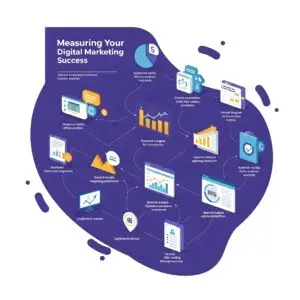Measuring Your Digital Marketing Success: Key Metrics That Matter
Launching digital marketing campaigns without tracking their performance is like driving without a dashboard – you have no idea if you’re heading in the right direction or achieving your goals. Identifying and monitoring the right key performance indicators (KPIs) is essential for understanding the effectiveness of your efforts, making data-driven decisions, and maximizing your return on investment.

The specific KPIs you should track will depend on your individual marketing objectives, but some key metrics are universally important:
- Website Traffic: This fundamental metric tells you how many people are visiting your website. Tracking overall traffic, as well as traffic sources (organic search, social media, referrals, direct), helps you understand where your audience is coming from and which channels are driving the most visits.
- Conversion Rate: This measures the percentage of website visitors who complete a desired action, such as filling out a form, making a purchase, or signing up for a newsletter. Tracking conversion rates for different goals helps you assess the effectiveness of your website and marketing campaigns in driving desired outcomes.
- Engagement Rate: This metric assesses how your audience interacts with your content. On social media, this includes likes, comments, shares, and saves. On your website, it could be time spent on page, bounce rate, or the number of pages visited per session. High engagement indicates that your content is resonating with your audience.
- Click-Through Rate (CTR): This measures the percentage of people who click on a link in your email, ad, or search result. A high CTR suggests that your messaging is compelling and relevant to your audience.
- Cost Per Acquisition (CPA): This metric calculates the cost of acquiring a new customer through a specific marketing channel or campaign. Understanding your CPA helps you determine the efficiency and profitability of your marketing efforts.
- Return on Investment (ROI): Ultimately, ROI measures the profitability of your marketing investments. It calculates the revenue generated from your marketing activities compared to the costs incurred. Tracking ROI helps you understand which campaigns are delivering the best results and justifying your marketing spend.
Regularly monitoring these and other relevant KPIs allows you to identify what’s working, what’s not, and where you can optimize your strategies for better performance. By embracing a data-driven approach, you can make informed decisions, allocate your resources effectively, and ultimately achieve your digital marketing goals.
